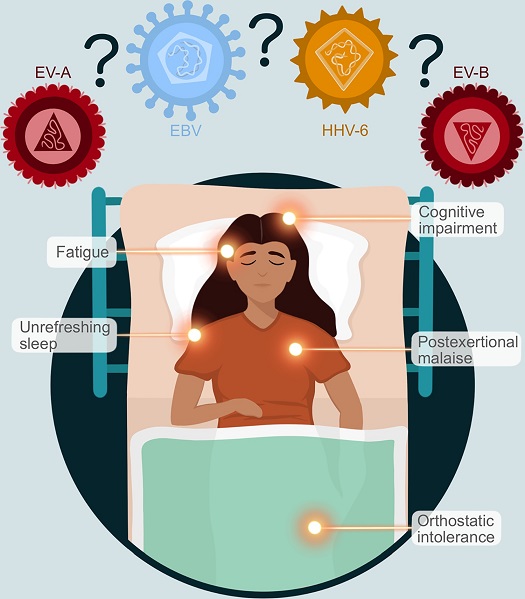Cornell University Study Proposes That Chronic Fatigue Syndrome Is Basically A Condition With Post-Viral Infection Origins
Nikhil Prasad Fact checked by:Thailand Medical News Team Sep 06, 2023 2 years, 4 months, 3 days, 19 hours, 39 minutes ago
Chronic Fatigue Syndrome (CFS), also known as Myalgic Encephalomyelitis (ME), is a debilitating condition that has baffled medical professionals and researchers for decades. The exact causes of ME/CFS are shrouded in mystery, and patients often struggle with its devastating impact on their lives. However, a new study by Professor Dr Maureen R. Hanson at Cornell University has shed new light on the origins of this enigmatic illness, proposing that it may be fundamentally linked to post-viral infections, particularly those involving the enterovirus family.
 The 5 diagnostic criteria for ME/CFS recommended by the IOM committee.
The 5 diagnostic criteria for ME/CFS recommended by the IOM committee.
Artist credit: Jessica Maya.
ME/CFS: A Complex and Multifactorial Condition
Before delving into Professor Hanson's research, it's essential to understand the complexity of
Chronic Fatigue Syndrome or ME/CFS. This condition is characterized by extreme fatigue, cognitive impairments, post-exertional malaise, unrefreshing sleep, and various other symptoms. While numerous theories and factors have been suggested as potential contributors to ME/CFS, no single cause has been definitively identified.
Hypotheses Surrounding ME/CFS Causes
Professor Hanson explores several hypotheses regarding the causes of ME/CFS, emphasizing the potential role of viral infections, particularly those from the enterovirus family. However, other factors have also been considered, including infections with human herpesviruses (HHVs), post-viral syndromes like post-acute sequelae of COVID-19 (PASC), immune system abnormalities, genetic factors, central nervous system involvement, environmental factors, cellular energy metabolism issues, hormonal dysregulation, and gut microbiota imbalances.
The Role of Viral Infections
Professor Hanson's research focuses on viral infections as a significant investigative path, given the historical outbreaks of ME/CFS that coincide with viral outbreaks and the evidence of chronic viral infection in some ME/CFS patients. This leads to the hypothesis that certain viruses, particularly enteroviruses, might play a central role in the development of ME/CFS.
Historical Evidence: Enterovirus Family
Historical evidence provides persuasive support for the involvement of enteroviruses in ME/CFS. Early outbreaks of ME/CFS often occurred in tandem with outbreaks of polio, a disease caused by enteroviruses. ME/CFS patients in these clusters typically lived or worked closely with polio patients, suggesting a possible connection between the two conditions.
Furthermore, the symptom profiles of ME/CFS cases from those historical outbreaks align with known enteroviral infections. This variability in symptoms can be attributed to different members of the extensive enterovirus family or variants of the same virus being responsible for various outbreaks.
Contemporary Evidence: Chronic Viral Infection
Recent research by Dr John
Chia and colleagues provides compelling contemporary evidence of chronic viral infection in ME/CFS patients. Stomach biopsies from ME/CFS patients showed persistent enteroviral infection years after the initial acute infection, demonstrating the potential for these viruses to persist in tissues.
https://pubmed.ncbi.nlm.nih.gov/19828908/
However, one challenge in identifying enteroviruses as the sole culprits of ME/CFS is the high frequency of enteroviral infections worldwide, making it difficult to discern a differential exposure to these viruses in ME/CFS patients compared to healthy individuals.
Human Herpesviruses (HHVs) and ME/CFS
Aside from enteroviruses, some ME/CFS patients report an acute infection with HHVs, such as Epstein-Barr virus (EBV), as the onset of their illness. This raises questions about the potential role of HHVs in triggering or perpetuating ME/CFS. HHVs are known to reactivate during times of stress or illness, and their reactivation might contribute to ME/CFS symptoms in some cases.
Post-Acute Sequelae of COVID-19 (PASC) and ME/CFS
The emergence of the COVID-19 pandemic has added a new dimension to the study of ME/CFS. Post-Acute Sequelae of COVID-19 (PASC) refers to the lingering symptoms experienced by some individuals after recovering from COVID-19. These symptoms often overlap with those of ME/CFS, leading some to believe they have ME/CFS. However, the diagnostic criteria for ME/CFS were established before the pandemic, making it challenging to categorize these cases accurately.
Conclusion: The Urgent Need for Further Research
Professor Maureen R. Hanson's research at Cornell University has opened doors to a deeper understanding of ME/CFS, suggesting a strong link between this debilitating condition and post-viral infections, particularly those involving enteroviruses. While more research is needed to confirm these hypotheses, this breakthrough emphasizes the urgent need for further investigation into the role of viruses in ME/CFS and the potential development of targeted treatments.
ME/CFS remains a perplexing and often devastating condition, impacting millions of lives worldwide. By exploring the viral origins of this ailment, we may one day uncover the key to effective diagnosis and treatment, offering hope and relief to those who have long suffered in silence. As we continue to navigate the complex landscape of ME/CFS, one thing is clear: the quest for answers must persist, driven by the relentless pursuit of scientific understanding and the desire to improve the lives of ME/CFS patients.
The study findings were published in the peer reviewed journal: PLOS Pathogens.
https://journals.plos.org/plospathogens/article?id=10.1371/journal.ppat.1011523
For the latest about
Chronic Fatigue Syndrome (CFS), keep on logging to Thailand Medical News.
